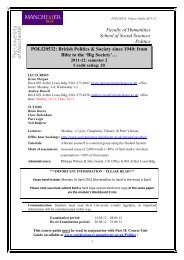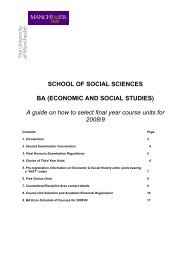CHNN 22, Spring 2008 - School of Social Sciences
CHNN 22, Spring 2008 - School of Social Sciences
CHNN 22, Spring 2008 - School of Social Sciences
Create successful ePaper yourself
Turn your PDF publications into a flip-book with our unique Google optimized e-Paper software.
sending the President <strong>of</strong> the Board <strong>of</strong> Education to open with a speech at the Science Museum,<br />
London. The debates were carefully sequenced and orchestrated to demonstrate the contemporary<br />
and philosophical relevance <strong>of</strong> the history <strong>of</strong> science from its place within general historical study<br />
to the contemporary philosophical controversies in biology and physics. There was a programme <strong>of</strong><br />
receptions at London clubs, Cambridge and Oxford colleges and the educational institutions <strong>of</strong><br />
London.<br />
Into this, the Russians flew to the surprise <strong>of</strong> all and the consternation <strong>of</strong> many. There followed a<br />
series <strong>of</strong> debates on the relevance <strong>of</strong> the history <strong>of</strong> science and clashes on the political and social<br />
significance <strong>of</strong> the subject between the congress ‘mainstream’, the British scientific left and the<br />
Russian delegation. The presence <strong>of</strong> Bukharin outraged the political right, which mobilized against<br />
him immediately through the leftovers <strong>of</strong> the 19<strong>22</strong> movement, principally the Daily Mail, Morning<br />
Post and Conservative backbench MPs. The more radical British scientists such as Lancelot<br />
Hogben, Joseph Needham, J D Bernal echoed the politicised concerns <strong>of</strong> some <strong>of</strong> the Russians and<br />
sought to support them.<br />
The best known <strong>of</strong> the delegates was Nikolai Bukharin, until recently the head <strong>of</strong> the Communist<br />
International and a revolutionary firmly under threat from Stalin. Bukharin retained positions<br />
associated with the Academy <strong>of</strong> <strong>Sciences</strong>, the role <strong>of</strong> science in the Five Year Plan and ‘the history<br />
<strong>of</strong> knowledge’. Two scientists <strong>of</strong> international reputation, the physicist, Abram I<strong>of</strong>fe, and the<br />
geneticist, Nikolai Vavilov attended. Neither were supporters <strong>of</strong> communism, though both held<br />
important positions in Russian science. The zoologist, Boris Zavadovsky, until recently a<br />
Deborinite ‘dialectician’, the engineer, Vladimir Mitkevich, a zealous Mechanist, and the economist<br />
and historian <strong>of</strong> science, Modest Rubinstein were relatively unknown. The delegation was<br />
un<strong>of</strong>ficially led by a mathematician, Ernst Kolman, sent to monitor the political orthodoxy <strong>of</strong> the<br />
other Russians. Finally, an unknown philosopher called Boris Hessen, who worked in physics,<br />
Deborinite philosophy and history <strong>of</strong> science. Hessen was under suspicion for his political views<br />
and had been forced into samo kritika at the hands <strong>of</strong> Kolman in the months leading up to the<br />
congress. These delegates sought to engage the congress for a variety <strong>of</strong> reasons that involved the<br />
complexities <strong>of</strong> philosophy, history, science an society and their own domestic predicaments.<br />
The intellectual controversy, the public campaign by the newspapers against Bukharin, and the<br />
arguments about politics and science appalled Singer, who saw his entire public relations strategy<br />
endangered by the Russians. He sought to silence their views and to minimize their impact on the<br />
congress, largely through threats and refusing to allow Russian papers. Needham and Hogben,<br />
both on his organizing committee, negotiated an agreement for the Russians to give their papers at<br />
a special session after the formal congress ended. The Russian delegation, recognising the danger<br />
to their own strategy <strong>of</strong> engagement with the international scientific community, rushed to<br />
translate and print their papers to be given out at this session. The subsequent publication, Science<br />
at the Cross Roads, proved to be <strong>of</strong> enduring interest. The paper <strong>of</strong> Boris Hessen on ‘the social and<br />
economic roots <strong>of</strong> Newton’s Prinkipia’ and that <strong>of</strong> Bukharin on ‘theory and practice’ in science and<br />
philosophy remain interesting and vibrant papers that require careful examination.<br />
The final level that reveals the unique character and timing <strong>of</strong> the congress is the social context <strong>of</strong><br />
the event. Britain in the summer <strong>of</strong> 1931 was in the grip <strong>of</strong> a political and economic maelstrom that<br />
affected every aspect <strong>of</strong> society. The Labour government teetered on the edge <strong>of</strong> collapse as the<br />
economic crisis struck Britain. Unemployment benefit had been cut, igniting a wave <strong>of</strong> protest that<br />
gathered in intensity throughout the summer <strong>of</strong> 1931. Mass riots were reported in the major cities.<br />
The government was disintegrating as its basis <strong>of</strong> support in the Labour movement collapsed.<br />
Europe fared even worse with bank runs and mass unemployment in Austria and Germany. Hitler<br />
announced he was ready for power in Germany while India continued to rebel against the British<br />
Empire. The nadir was a matter <strong>of</strong> weeks away when Ramsey MacDonald joined with the<br />
Conservatives and the naval mutiny at Invergordon exploded. Thus, the atmosphere was taut as the<br />
congress gathered with the political left and right mobilizing as the Labour government crumbled.<br />
Bukharin arriving in London at this juncture was viewed with extreme suspicion by much <strong>of</strong> the<br />
political establishment and embarrassment by the Labour government.<br />
The presence <strong>of</strong> the Russian delegation brought the political crisis to the floor <strong>of</strong> the Science<br />
Museum. This work analyses the streams <strong>of</strong> social context affecting the event and the political<br />
consciousness <strong>of</strong> those present.<br />
13
















